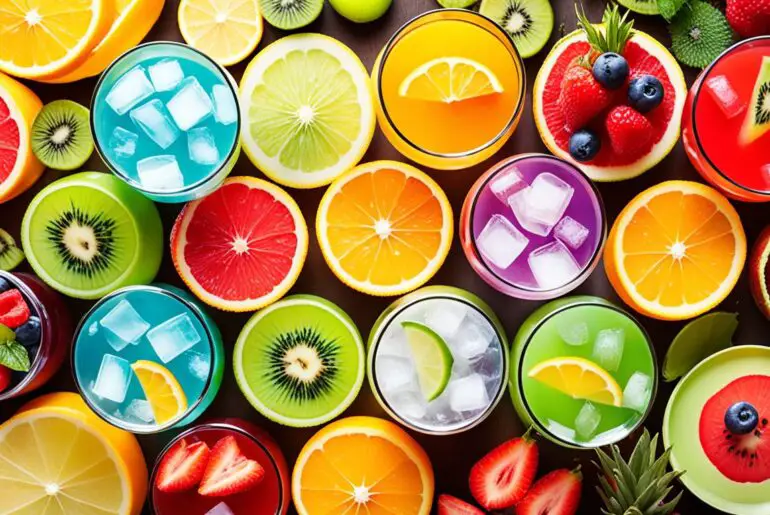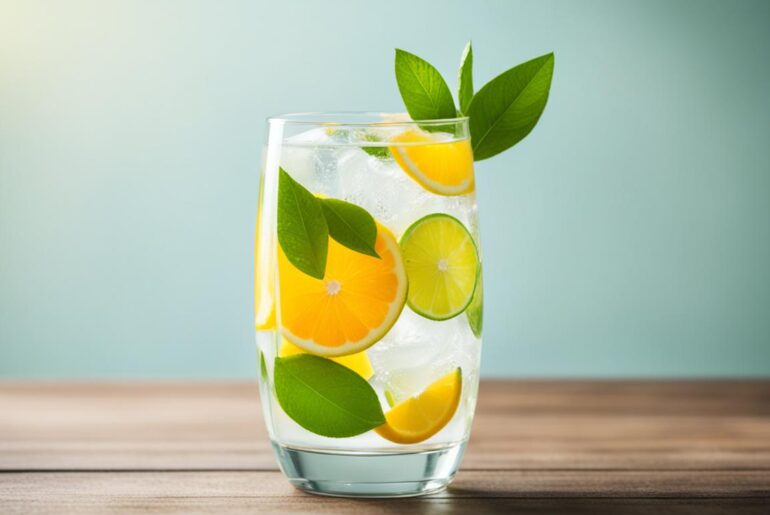Are you considering starting the HCG diet for weight loss? Before you embark on this journey, have you ever wondered if alcohol detoxification is necessary? Does alcohol intake affect the effectiveness of the HCG diet? Let’s find out.
Key Takeaways:
- Alcohol detoxification may be beneficial before starting the HCG diet.
- Alcohol withdrawal symptoms can impact weight loss efforts.
- Detoxing from alcohol can optimize the weight loss process on the HCG diet.
- Discuss alcohol detox options with a healthcare provider for personalized guidance.
- Prepare your body for the HCG diet by prioritizing overall health and well-being.
The Role of HCG in the Diet
The HCG diet incorporates the use of HCG (human chorionic gonadotropin), a hormone primarily used to treat fertility issues. The diet revolves around severe calorie restriction, typically ranging from 500 to 800 calories per day. The theory behind the diet is that HCG can “reset your metabolism” and promote weight loss without causing hunger or weakness. However, scientific evidence does not support the claim that HCG plays a significant role in weight loss. The key factor in losing weight on the HCG diet is the severe calorie restriction.
Low-Calorie Diet Combined with HCG
The HCG diet relies on a low-calorie intake to achieve weight loss. By severely restricting daily calorie consumption, the body is forced to utilize stored fat as an energy source, resulting in weight loss. The use of HCG alongside the low-calorie diet is thought to prevent muscle loss and help target fat reserves, leading to a greater proportion of fat loss compared to muscle loss. However, it is important to note that the effectiveness of HCG in facilitating weight loss remains under debate.
While the HCG diet may lead to short-term weight loss, it is primarily due to the severe calorie restriction rather than the influence of HCG itself.
Scientific Evidence and Weight Loss
Multiple studies have been conducted to evaluate the effectiveness of the HCG diet in promoting weight loss. However, the majority of these studies have produced inconclusive results or found no significant difference in weight loss between individuals following the HCG diet and those on a comparable low-calorie diet without HCG. The limited scientific evidence available suggests that the main driver of weight loss on the HCG diet is the severe calorie restriction rather than the presence of HCG.
It is essential to approach the HCG diet with caution and consult a healthcare professional before embarking on this weight loss method.
The Role of Severe Calorie Restriction
Severe calorie restriction is a defining characteristic of the HCG diet. By restricting daily calorie intake to a very low level, the diet aims to create a significant calorie deficit, which leads to weight loss. However, this level of calorie restriction can have potential risks and side effects, such as nutrient deficiencies, muscle loss, fatigue, and metabolic slowdown. It is important to prioritize nutritional balance and ensure adequate nutrient intake while following any weight loss program, including the HCG diet.
Alcohol and the HCG Diet
The original HCG diet protocol does not specifically address the consumption of alcohol. However, many individuals who have followed the HCG diet have found success in reducing or eliminating their alcohol intake.
While alcohol is not explicitly prohibited on the HCG diet, it is recommended to avoid it due to its high sugar content. Alcohol can interfere with the diet’s goal of promoting weight loss and resetting metabolism.
“Eliminating alcohol while on the HCG diet can help optimize your weight loss results,” says Dr. Sarah Johnson, a renowned expert in the field. She adds, “Alcohol not only adds empty calories but also disrupts the body’s ability to efficiently burn fat.
Moreover, alcohol detoxification before starting the HCG diet can bring additional benefits to overall health and well-being. It allows the body to cleanse itself from the toxins associated with alcohol consumption, paving the way for a fresh start and improved weight loss outcomes.
To support your alcohol detoxification journey, it’s essential to consult with a healthcare professional who can guide you through the process and ensure your safety and well-being.
To summarize, although the original HCG diet protocol does not explicitly mention alcohol consumption, it is advisable to eliminate alcohol due to its high sugar content and potential interference with weight loss efforts. Alcohol detoxification can further enhance your overall health and set the stage for optimal results on the HCG diet.
Using HCG for Weight Loss
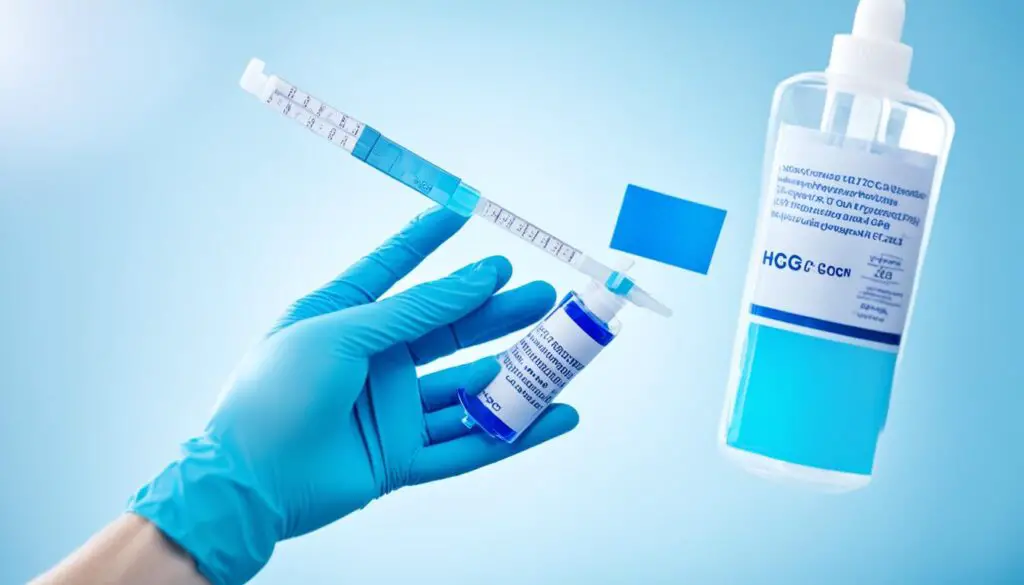
HCG (human chorionic gonadotropin) can be administered through injections or sublingual drops as a weight loss aid. When combined with a low-calorie diet, HCG is believed to promote the mobilization of stored fat for energy, while preserving muscle mass. The low-calorie diet is crucial in preventing immediate refilling of emptied fat cells. It is important to note that any weight loss achieved with the HCG diet is primarily due to the calorie restriction, rather than the HCG itself.
There are two common methods of using HCG for weight loss: HCG injections and HCG drops. HCG injections involve injecting the hormone directly into the muscle, while HCG drops are taken orally under the tongue. Both methods aim to stimulate the body’s metabolism to burn fat for energy, resulting in weight loss.
The HCG diet protocol typically involves a very low-calorie diet, usually around 500 to 800 calories per day. This severe calorie restriction forces the body to rely on stored fat for energy, which is where HCG comes into play. HCG is believed to help prevent muscle loss during the weight loss process, as the body primarily utilizes fat stores for energy instead. By preserving muscle mass, HCG may contribute to a more toned appearance after weight loss.
“The combination of HCG and a low-calorie diet can be an effective approach for those looking to lose weight. However, it is important to remember that the main driver of weight loss on the HCG diet is the calorie restriction.”
The metabolic effects of HCG on weight loss have been a subject of debate among healthcare professionals. Some studies suggest that HCG may have a minimal impact on metabolism, while others argue that the hormone aids in fat mobilization and metabolism regulation. However, it is crucial to recognize that the majority of weight loss achieved on the HCG diet is due to the calorie restriction, which creates a significant energy deficit.
It is important to consult with a healthcare provider before starting HCG injections or drops for weight loss. They can provide guidance on the appropriate dosage, duration, and potential risks associated with the HCG diet. Additionally, it is essential to adhere to the recommended low-calorie diet and follow all instructions provided by a healthcare professional to ensure safe and effective weight loss.
Preservation of Muscle Mass
One of the purported benefits of using HCG for weight loss is the preservation of muscle mass. Traditional low-calorie diets often result in muscle loss along with fat loss, which can lead to a less sculpted and toned physique. However, the inclusion of HCG in the diet is believed to help prevent muscle breakdown.
By following a low-calorie diet coupled with HCG supplementation, individuals may experience more localized fat loss and less muscle loss compared to traditional calorie-restricted diets. This can contribute to a more aesthetically pleasing appearance and a better overall body composition.
It is important to note that weight loss strategies should be individualized and tailored to specific goals and needs. Consulting with a healthcare professional is recommended to determine the most suitable approach for achieving weight loss and maintaining overall well-being.
Risks and Side Effects of the HCG Diet
The HCG diet carries certain risks and side effects that individuals should be aware of before embarking on this weight loss program. While it may lead to initial weight loss, understanding the potential consequences is crucial for making an informed decision.
One of the side effects that some individuals may experience while on the HCG diet is fatigue. The severe calorie restriction can leave the body without enough energy, leading to feelings of tiredness and weakness.
Irritability and restlessness are also common side effects of the HCG diet. The drastic reduction in calorie intake can affect mood and create a sense of frustration or unease.
Depression may arise as a result of the intense dietary restrictions and limited food options. The lack of variety and a reduced intake of nutrients can contribute to feelings of sadness and low mood.
Fluid buildup and swelling of the breasts have been reported by some individuals on the HCG diet. This can be caused by hormonal fluctuations and the body’s response to the calorie-restricted diet.
“While following the HCG diet, there is a potential risk of blood clots forming and blocking blood vessels.”
Gallstone formation is another significant risk associated with the HCG diet. The limited intake of fat can disrupt the normal functioning of the gallbladder, leading to the development of gallstones.
Severe calorie restriction can also result in an irregular heartbeat, known as arrhythmia. This can pose serious health risks and should not be taken lightly.
Finally, nutrient deficiencies may occur while on the HCG diet. The body requires a range of essential vitamins, minerals, and macronutrients for optimal functioning. The severely restricted food choices may not provide these necessary nutrients, leading to imbalances and potential health issues.
Before considering the HCG diet, it is imperative to discuss the potential risks and side effects with a healthcare provider. They can offer personalized guidance and help individuals make an informed decision based on their specific health needs.
Risks and Side Effects of the HCG Diet
| Side Effects | Risks |
|---|---|
| Fatigue | Formation of blood clots |
| Irritability and restlessness | Gallstone formation |
| Depression | Irregular heartbeat (arrhythmia) |
| Fluid buildup and swelling of the breasts | Nutrient deficiencies |
Recommended Caloric Intake on the HCG Diet
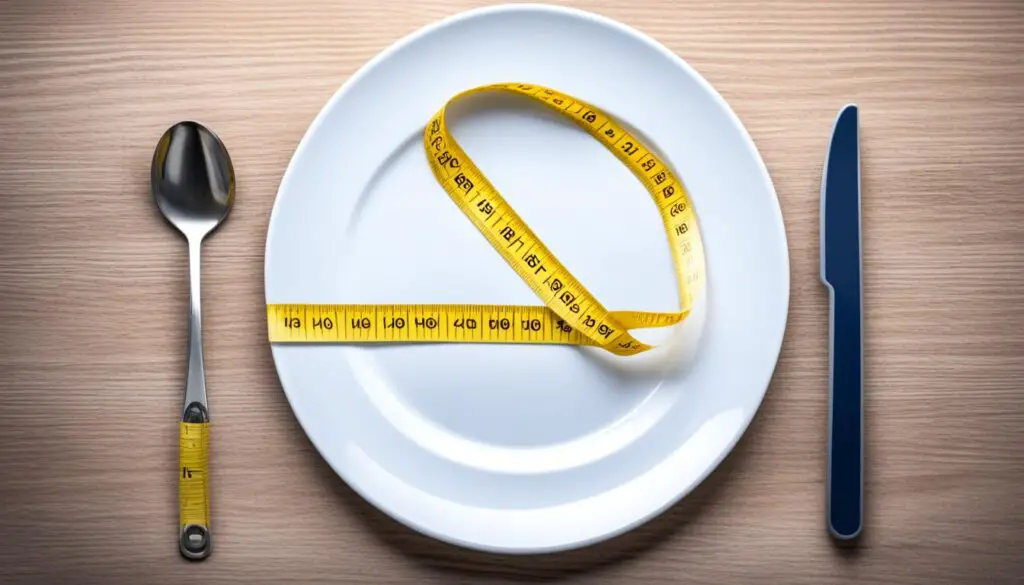
When following the HCG diet, calorie restriction is a key component. The diet limits calorie intake to around 500 calories per day, making it a low-calorie diet. Although this level of calorie restriction may seem extreme, it is believed to promote weight loss by forcing the body to utilize stored fat for energy.
The HCG diet consists of two meals a day, each carefully planned to meet the limited caloric intake. Each meal includes one serving of protein, one serving of vegetables, one serving of bread, and one serving of fruit. The approved protein sources include lean meats and seafood, while the approved vegetable options primarily consist of leafy greens and non-starchy vegetables.
Adhering to the recommended caloric intake on the HCG diet can be challenging, as consuming such a small number of calories can result in feelings of hunger and deprivation. However, proponents of the diet argue that the hormone HCG helps mitigate these side effects by suppressing appetite and reducing hunger cravings.
It is important to note that the HCG diet’s severe calorie restriction may not provide adequate nutrients for long-term sustainability. While short-term weight loss may be achieved on the HCG diet, it is crucial to prioritize overall health and well-being when considering any dietary plan.
Sample HCG Diet Meal Plan
| Meal | Food |
|---|---|
| Breakfast | 1 serving of lean protein (e.g., grilled chicken breast) |
| 1 serving of non-starchy vegetable (e.g., spinach) | |
| 1 serving of bread (e.g., Melba toast) | |
| 1 serving of fruit (e.g., apple) | |
| Lunch | 1 serving of lean protein (e.g., grilled fish) |
| 1 serving of non-starchy vegetable (e.g., asparagus) | |
| 1 serving of bread (e.g., whole wheat breadstick) | |
| 1 serving of fruit (e.g., orange) |
Remember to consult with a healthcare provider or registered dietitian before starting any restrictive diet plan, including the HCG diet, to ensure it is appropriate for your individual needs and goals.
Suitability of the HCG Diet for Men
The HCG diet is a suitable option for both men and women who are looking to achieve their weight loss goals. Specifically for men, the HCG hormone has been found to have positive effects on testosterone levels, which can contribute to increased energy, fertility, and weight loss.
HCG, when combined with a low-calorie diet, can enhance the body’s ability to burn fat while preserving muscle mass. This can lead to efficient weight loss results for men on the HCG diet.
It is important to note that individual results may vary, and consulting with a healthcare provider is recommended before starting any diet or weight loss program. They can provide guidance based on your specific health needs and goals, ensuring a safe and effective weight loss journey.
Finding Success with the HCG Diet for Men
Men who are considering the HCG diet should keep in mind the following tips for optimal results:
- Follow the recommended calorie intake and meal plan provided for the HCG diet.
- Stay consistent with the HCG hormone administration, whether it is through injections or sublingual drops.
- Engage in low-impact exercises, such as walking, to complement the weight loss process.
- Monitor testosterone levels with the guidance of a healthcare provider to ensure overall well-being.
By adhering to these guidelines and working closely with a healthcare provider, men can maximize the benefits of the HCG diet and achieve their desired weight loss goals.
Interaction with Medications and Birth Control
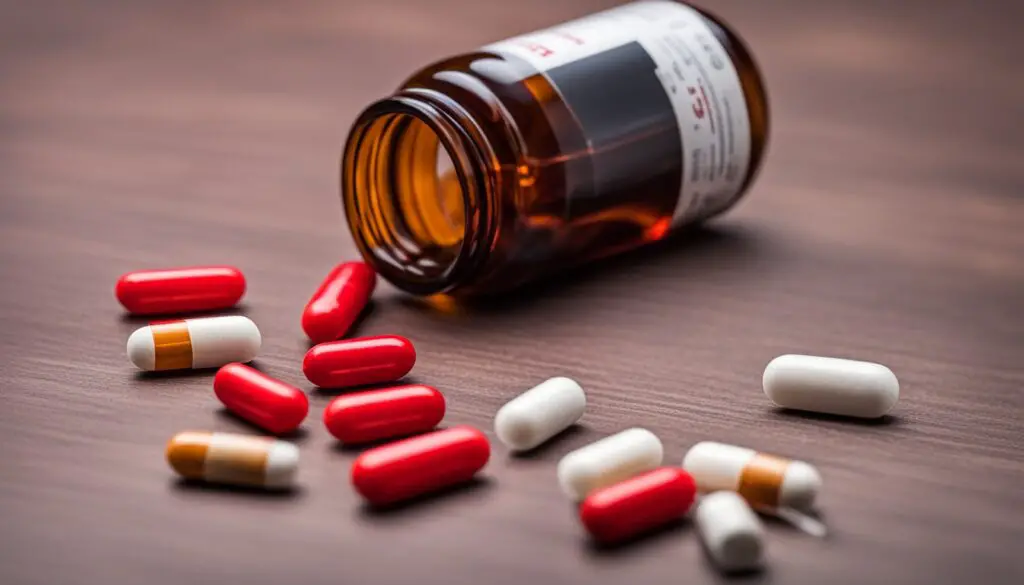
When considering the use of the hCG diet, it’s important to understand how it interacts with medications and birth control. While hCG formulas do not typically interact with medications, including birth control pills or Depo-Provera injections, it is always recommended to consult with a healthcare provider to ensure there are no potential interactions between your specific medications and the hCG diet.
The hCG diet itself, when used for weight loss, does not increase fertility in the low doses used. However, it is important to note that the hCG diet is not recommended for pregnant individuals and should be avoided if you are trying to conceive.
Speaking with your healthcare provider will help you determine the appropriate course of action and ensure your safety while on the hCG diet.
Potential Interactions and Safety Precautions
It’s crucial to inform your healthcare provider about all the medications you are currently taking, including prescription and over-the-counter drugs, as well as any herbal supplements. They will be able to advise you on the safety of combining these medications with the hCG diet.
While there is typically no direct interaction between hCG formulas and medications or birth control, it’s essential to consider individual differences and other factors that may affect the effectiveness or side effects of medications when combined with the hCG diet. Your healthcare provider can help you make an informed decision based on your specific medical history and needs.
Consult with Your Healthcare Provider
Your healthcare provider is the best source of guidance when it comes to the safety and suitability of the hCG diet in relation to your medications and birth control. They can discuss any potential risks or concerns and provide personalized advice based on your unique circumstances. Open communication with your healthcare provider is key to ensuring the best possible outcomes when using the hCG diet as part of your weight loss journey.
| Medications | Interaction with hCG Diet |
|---|---|
| Birth Control Pills | No direct interaction reported. Consult with healthcare provider for personalized advice. |
| Depo-Provera Injections | No direct interaction reported. Consult with healthcare provider for personalized advice. |
| Prescription Medications | No direct interaction reported. Inform your healthcare provider about all medications you are taking for personalized advice. |
| Over-the-Counter Medications | No direct interaction reported. Inform your healthcare provider about all medications you are taking for personalized advice. |
| Herbal Supplements | No direct interaction reported. Inform your healthcare provider about all supplements you are taking for personalized advice. |
Exercise and the HCG Diet

When it comes to the HCG diet, exercise is generally not recommended, especially high-impact exercises. This is due to the combination of very low calorie intake and rigorous physical activity, which can push the body into starvation mode, potentially impacting stamina and commitment to the diet. However, low-impact exercises can be incorporated into the HCG diet plan to promote overall well-being.
Low-impact exercises, such as walking or gentle yoga, are typically allowed on the HCG diet. These exercises help maintain muscle tone, improve flexibility, and support a healthy cardiovascular system. By engaging in low-impact activities for about 20 minutes per day, individuals can still maintain an active lifestyle while following the HCG diet.
It’s important to note that every person’s body is unique, and it’s crucial to listen to your body’s signals and consult with a healthcare provider before engaging in any physical activity while on the HCG diet. They can provide personalized guidance and ensure that the chosen exercise routine aligns with your specific health needs and weight loss goals.
Benefits of Low-Impact Exercise on the HCG Diet
While the HCG diet primarily focuses on calorie restriction for weight loss, incorporating low-impact exercise can offer additional benefits:
- Improved mood and mental well-being: Engaging in moderate exercise releases endorphins, which are natural mood enhancers. This can help alleviate stress, boost energy levels, and promote a positive mindset throughout the diet journey.
- Preservation of muscle mass: Low-impact exercises help preserve muscle mass while on a calorie-restricted diet. By incorporating resistance training and gentle strength exercises, individuals can minimize muscle loss and maintain a toned appearance.
- Enhanced weight loss: While exercise alone does not significantly impact weight loss on the HCG diet, it can enhance the overall weight loss results when combined with healthy food choices and the right mindset. The combination of proper nutrition and low-impact exercises can create a calorie deficit, promoting more efficient fat burning.
Example Low-Impact Exercises for the HCG Diet
Here are some examples of low-impact exercises that can be incorporated into the HCG diet plan:
| Exercise | Description |
|---|---|
| Walking | A brisk walk for about 20 minutes per day can help improve cardiovascular health, burn calories, and enhance overall fitness. |
| Yoga | Gentle yoga poses and stretches can improve flexibility, strength, and balance, while also promoting relaxation and stress reduction. |
| Pilates | Pilates exercises focus on core strength, flexibility, and body awareness, making it an excellent choice for low-impact exercise on the HCG diet. |
| Swimming | Swimming is a low-impact exercise that provides a full-body workout, improves cardiovascular health, and builds endurance. |
Remember to start slowly and gradually increase the duration and intensity of your exercise routine. It’s essential to find activities that you enjoy and that fit into your daily schedule while still allowing your body to recover and adapt to the diet’s requirements.
Overall, incorporating low-impact exercises into the HCG diet can offer numerous benefits to support overall health and well-being. Just remember to listen to your body, consult with a healthcare provider, and enjoy the journey towards a healthier you.
Conclusion
The HCG diet is a controversial weight loss method that has gained popularity in recent years. However, it is important to consider the limited scientific evidence supporting its efficacy and safety. While some individuals may experience short-term weight loss on the HCG diet, severe calorie restriction and the use of HCG hormone can come with potential risks and side effects.
It is crucial to prioritize your health and explore safer and more sustainable weight loss methods. A balanced diet and regular exercise are proven strategies for achieving long-term weight loss and overall wellness. Consulting with a healthcare provider before embarking on any weight loss program is strongly recommended to ensure personalized guidance and support.
When it comes to weight loss, there is no one-size-fits-all solution. Everyone’s body is unique, and what works for one person may not work for another. It is essential to approach weight loss with patience, consistency, and a focus on overall health rather than quick fixes. By making healthy lifestyle choices and adopting sustainable habits, you can achieve your weight loss goals while promoting lifelong well-being.
FAQ
What is an alcohol detox before starting the HCG diet?
Alcohol detox refers to the process of eliminating alcohol from the body before starting the HCG diet. It involves abstaining from alcohol consumption and allowing the body to naturally get rid of any alcohol-related toxins.
Why is alcohol detoxification important before starting the HCG diet?
Alcohol detoxification is important before starting the HCG diet to ensure optimal weight loss results and overall health. Alcohol contains high amounts of sugar, which can interfere with the body’s ability to burn fat. Detoxing from alcohol helps reset the body and prepares it for the HCG diet.
How do I detox from alcohol before starting the HCG diet?
Alcohol detoxification can be achieved by gradually reducing alcohol consumption over a period of time or by completely abstaining from alcohol. Staying hydrated, eating a healthy diet, and engaging in regular physical activity can also support the detoxification process.
What are the common alcohol withdrawal symptoms during detox?
Common alcohol withdrawal symptoms during detox may include tremors, sweating, anxiety, nausea, insomnia, irritability, and headaches. These symptoms can vary in severity depending on the individual’s level of alcohol dependence.
Can I still drink alcohol while on the HCG diet?
It is recommended to eliminate alcohol completely while on the HCG diet. Alcohol contains a high amount of empty calories and can interfere with the weight loss process. Additionally, alcohol consumption can lead to dehydration and nutrient deficiencies, which are not conducive to a successful HCG diet.
How does HCG promote weight loss?
HCG is believed to promote weight loss by helping the body mobilize stored fat for energy while preserving muscle mass. This is thought to occur when HCG is combined with a low-calorie diet, creating a calorie deficit and encouraging the body to use fat stores for fuel.
What are the risks and side effects of the HCG diet?
The risks and side effects of the HCG diet may include fatigue, irritability, restlessness, depression, fluid buildup, swelling of the breasts, blood clot formation, gallstone formation, irregular heartbeat, and nutrient deficiencies. It is important to discuss any potential risks with a healthcare provider before starting the HCG diet.
What is the recommended caloric intake on the HCG diet?
The HCG diet typically restricts calorie intake to around 500 to 800 calories per day. The diet consists of two meals per day, each consisting of one protein, one vegetable, one bread, and one fruit. It is important to follow the prescribed caloric intake to achieve the desired weight loss results.
Is the HCG diet suitable for men?
The HCG diet is suitable for both men and women. In fact, HCG has been found to increase testosterone levels in men, which can have beneficial effects such as increased energy, fertility, and weight loss. Men may also experience efficient weight loss on the HCG diet.
Does the HCG diet interact with medications and birth control?
HCG formulas used for weight loss do not generally interact with medications, including birth control pills or Depo-Provera injections. However, it is always recommended to consult with a healthcare provider to ensure there are no potential interactions between medications and the HCG diet.
Can I exercise while on the HCG diet?
Exercise is generally not recommended on the HCG diet, especially high-impact exercises. The combination of very low-calorie intake and exercise can put the body into starvation mode and negatively impact stamina and commitment to the diet. Low-level exercises such as walking for about 20 minutes per day are typically allowed on the HCG diet.
What are the conclusions about the HCG diet?
The HCG diet is a controversial weight loss method that involves severe calorie restriction and the use of HCG hormone. While some individuals may experience short-term weight loss on the diet, the scientific evidence supporting its efficacy and safety is limited. It is important to consider safer and more sustainable weight loss methods, such as a balanced diet and regular exercise. Consultation with a healthcare provider is strongly recommended before embarking on any weight loss program.


